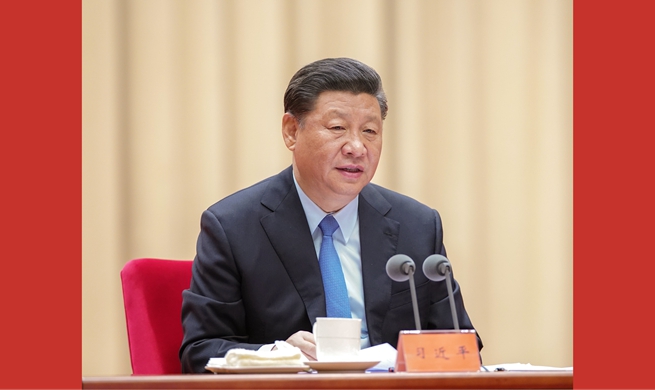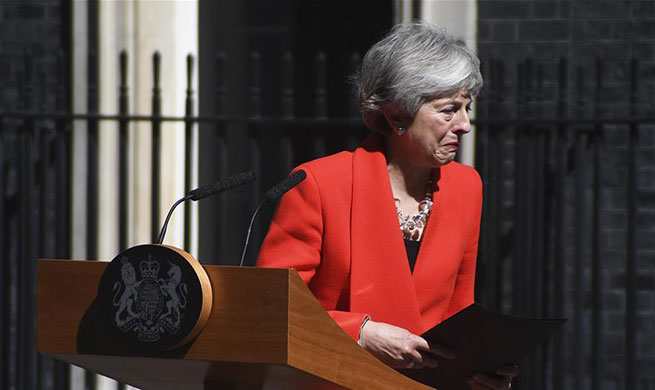WASHINGTON/MEXICO CITY, June 1 (Xinhua) -- Government officials, trade experts, business associations in both the United States and Mexico have seen no point but harm -- to others and itself -- of the Trump administration's decision to impose a 5 percent tariff on all goods coming from Mexico.
Puzzled and angry, some called for twice-thinking by the U.S. president and his administration.
In a surprise Twitter announcement on Thursday, Trump said that on June 10, "the United States will impose a 5% Tariff on all goods coming into our Country from Mexico, until such time as illegal migrants coming through Mexico, and into our Country, STOP. The Tariff will gradually increase until the Illegal Immigration problem is remedied."
Some U.S. business organizations warned that the tariffs threat on Mexican imports would only hurt U.S. business and families.
"These proposed tariffs would have devastating consequences on manufacturers in America and on American consumers," said Jay Timmons, president and chief executive officer of the National Association of Manufacturers.
"We have taken our concerns to the highest levels of the administration and strongly urge them to consider carefully the impact of this action on working families across this country," Timmons said.
The National Retail Federation, a renowned retail trade association in the United States, issued a statement on Friday, saying "the growing tariff bill paid by U.S. businesses and consumers is adding up and will raise the cost of living for American families."
Business Roundtable, a group of chief executive officers of major U.S. corporations, said on Friday that "imposing unilateral tariffs on Mexican imports would be a grave error."
The organization strongly urges the Trump administration to stop moving forward with these tariffs, which would "create significant economic disruption and tax U.S. workers, farmers, consumers and businesses."
"These tariffs will be paid by American families and businesses without doing a thing to solve the very real problems at the border," said Neil Bradley, executive vice president and chief policy officer of the U.S. Chamber of Commerce.
According to the chamber's research, a 5 percent tariff on Mexican imports would result in a potential tax increase on American businesses and consumers of 17 billion U.S. dollars.
"The strategy seems to be to coerce Mexico into cooperating more on immigration, but these tariffs will really just cause even more harm to Americans," Tori K. Whiting, an economist specializing in trade at the Heritage Foundation, told Xinhua.
Trump said he will lift the tariffs only if "the illegal migration crisis is alleviated through effective actions taken by Mexico." However, experts cannot agree that tariffs are the solution to curb the migration tide.
"Unilateral tariffs on all Mexican imports will not solve the urgent problems of securing our border and fixing our broken immigration system. We urge the Administration to engage constructively with our neighbors and allies to resolve trade, migration and security issues in ways that will benefit Americans, not cause economic damage," read the Business Roundtable statement.
"While most of the immigration at the southern border has been from Central America, if this action harms the Mexican economy, it will likely increase the number of Mexicans also looking to cross the border into the United States," said Dan Mahaffee, senior vice president and director of policy at the Center for the Study of Congress and the Presidency.
"Moving ahead with these tariffs would also jeopardize the prospects for the Administration's top trade priority -- the United States-Mexico-Canada Agreement (USMCA) -- and would undermine duty-free North American trade that supports over 12 million American jobs," said the Business Roundtable statement.
The USMCA is a signed but not ratified free trade agreement between Canada, Mexico and the United States.
The Trump administration's tariffs announcement was made at a time when the USMCA is awaiting the ratification of the legislative bodies of the three participant countries.
"Manufacturers have been working hard to secure passage of the U.S.-Mexico-Canada Agreement, and the last thing we want to do is put that landmark deal and the 2 million manufacturing jobs that depend on North American trade in jeopardy," Timmons warned.
The tariffs plan has also stirred up opposition in its southern neighbor.
Mexico's Foreign Minister Marcelo Ebrard said on Friday that the U.S. tariffs move was "unfair" and the treatment "makes no economic sense for anyone," given that Mexico is the U.S. main trade partner.
Mexican President Andres Manuel Lopez Obrador said on Friday that the U.S. tariffs on imported Mexican goods would harm both countries.
"I believe that President Trump will understand that this is not the way to solve things. I believe there is going to be a rectification, immediately, there has to be one," said Lopez Obrador.
On Thursday night, Lopez Obrador sent a letter to Trump, calling for dialogue to solve the underlying problem of immigration. "Social problems are not resolved with tariffs or coercive measures," said the Mexican president.













